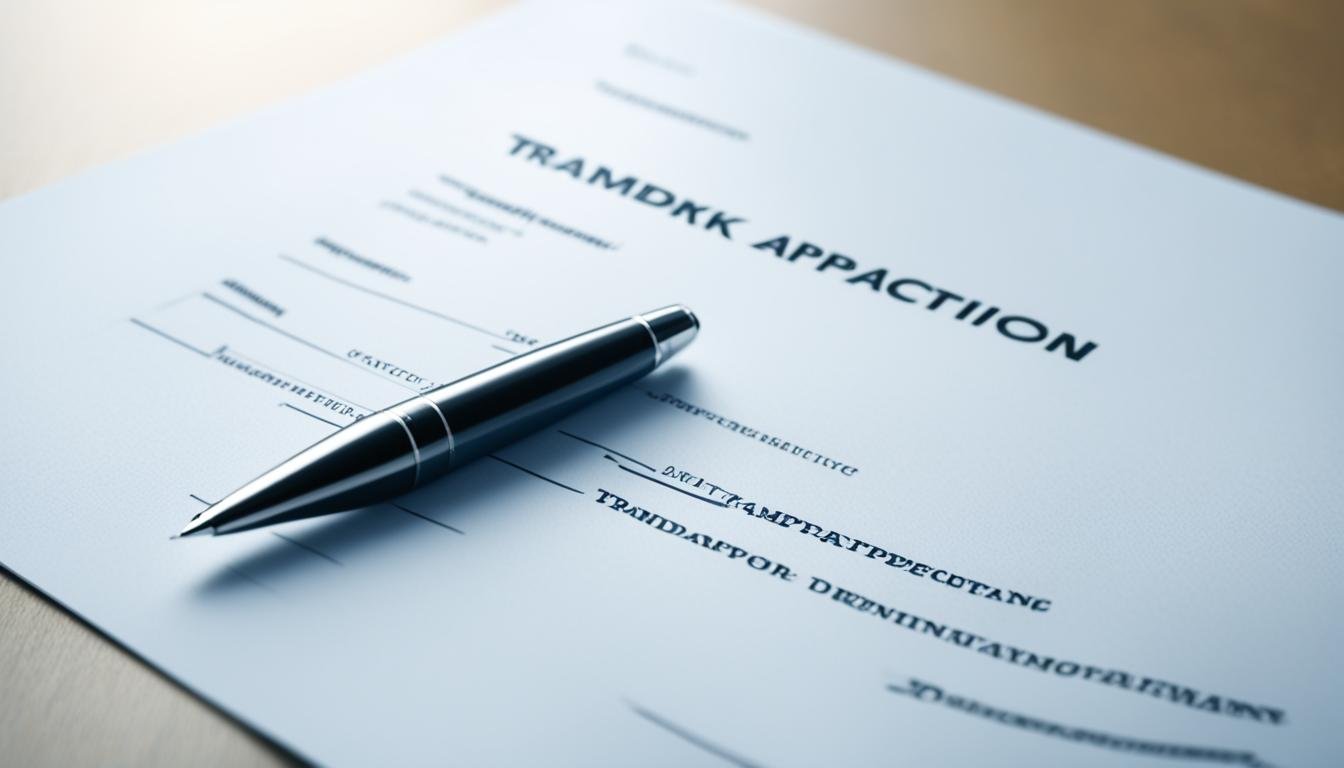Did you know about 80% of trademark applications face issues or objections? This fact shows how tough it can be to protect your brand with trademark registration. We’re going to share some cautionary stories about trademark applications and the important lessons they teach.
Avoiding common mistakes is key when you file for a trademark. Knowing these pitfalls can help protect your brand. It also prevents expensive legal problems later.
If you need help with your trademark application, Super Attorneys Of Irvine can assist. They are experts in trademark law in Orange County, California. For support, call them at 949-996-9546 or visit their website to find your ideal attorney.
Key Takeaways:
- A significant percentage of trademark applications face challenges or objections during the registration process.
- Understanding common mistakes and pitfalls in trademark applications is crucial to ensuring brand protection.
- Seeking the assistance of experienced trademark attorneys can help navigate the complexities of the registration process.
- Super Attorneys Of Irvine offers specialized expertise in trademark law and can provide valuable support throughout the application process.
- By learning from cautionary tales and following best practices, you can safeguard your brand and avoid costly legal battles in the future.
The Legal Process and Costs of Enforcing an Unregistered Trademark
Enforcing an unregistered trademark is tough and costly. The first step usually involves sending a cease and desist letter. This letter warns the other party of legal action and asks for damages. Sending this letter costs about $1000 to $1500.
If the other party doesn’t stop using the trademark, you might need to file an opposition. This stops them from officially registering your mark. Filing opposition costs about $2000 in Canada and $5000 in the U.S.
Another step is to get a permanent injunction from the court. This legally stops the infringer from using your mark. It also lets you claim damages. The legal fight can cost between $25,000 and $50,000 in Canada. It can cost even more in the U.S. These costs could be avoided by registering your trademark early on.

Key Costs in Enforcing an Unregistered Trademark
| Step | Cost |
|---|---|
| Sending a Cease and Desist Letter | $1000 – $1500 |
| Filing Oppositions (Canada) | $2000 |
| Filing Oppositions (United States) | $5000 |
| Obtaining Permanent Injunctions | $25,000 – $50,000 (Canada) Even more (United States) |
The costs for enforcing an unregistered trademark add up fast. By registering your trademark early, you can dodge these fees. This protects your brand better.
Lessons from the Duke and Duchess of Sussex’s Trademark Ordeal
The Duke and Duchess of Sussex faced challenges with their trademark. Their story is a lesson for everyone about international trademark registration. It’s important to do a trademark search both at home and abroad. This helps find possible conflicts with existing trademarks.
“Conducting a trademark clearance search is crucial to ensure that your desired mark is available for use and registration,” says Sarah Peterson, a trademark attorney at Legal Trademark Associates. “By conducting this search, you can determine if there are any marks that could potentially create confusion with your own.”
Your trademark should truly represent your company’s products or services. It must not mislead consumers. Choosing clear and accurate goods and services helps convey the right message to consumers.
“When selecting goods and services, it is important to be precise and specific,” advises Mark Thompson from Global Trademark Solutions. “Clearly defining the scope of your mark helps prevent competitors from capitalizing on similar marks.”
It’s also key to keep your international trademark plans secret while filing. This way, others can’t register similar trademarks. Keeping quiet helps protect against trademark squatters who might try to claim your mark.
When you want to register a trademark internationally, you need good legal advice. Hire trademark lawyers from the U.S. and the target country. Trademark laws differ around the world. Having experts in each place makes sure you follow the local rules.
“Navigating the international trademark filing process can be complex,” states Maria Lopez, a trademark attorney at Global Law Firm. “Engaging legal representation with experience in international trademark matters increases the likelihood of a successful registration.”
The Paris Convention helps with filing trademarks in multiple countries based on your home country’s registration. Knowing how the Paris Convention works can make international filing easier.
Benefits of the Paris Convention
- Priority: Allows applicants to prioritize their home country filing and extend it to other member countries within a certain time frame.
- Right of priority: Ensures that the application date of the home country filing is recognized in the other member countries.
- Simplified filing: Simplifies the administrative procedures and documentation required for international trademark registration.
- Cost-effective: Reduces the need for separate filings in each individual member country.
The trademark ordeal of the Duke and Duchess teaches us a lot. It shows the need for careful research and selecting the right goods and services. Keeping the filing process secret and getting good legal help are crucial for international registration.
“Learning from their experience allows us to better protect our own trademarks and avoid potential pitfalls,” concludes Peterson.
References
Sarah Peterson, Trademark Attorney at Legal Trademark Associates
Mark Thompson, Trademark Expert at Global Trademark Solutions
Maria Lopez, Trademark Attorney at Global Law Firm
Advantages of International Trademark Registration
| Advantages | Description |
|---|---|
| Extended protection | Provides protection in multiple countries |
| Global brand recognition | Increases brand visibility worldwide |
| Legal rights and remedies | Enables enforcement of trademark rights in various jurisdictions |
| Market expansion | Facilitates market entry into international markets |
| Competitive advantage | Ensures exclusivity in foreign markets |

Avoiding Scams and Hoaxes in Trademark Registration
Scams and hoaxes in trademark registration have grown common in our digital world. It’s crucial for small business owners to know the red flags of a scam. Being vigilant and informed helps protect your brand from trademark registration scams.
Obtaining Trademark Protection under Common Law
A false claim is that you must register your business name to have trademark rights. In truth, using your trademark in business gives you common law protection. Still, it’s good to remember that this protection is not as strong as registered trademarks offer.
The First-to-Use Principle
The idea that a later trademark registration beats earlier use is wrong. The first-to-use principle states that the initial user of the mark owns it, no matter who registers later. But, always check with a licensed attorney to protect your rights fully.
Verification of Licensed Attorneys
Ensure that any trademark registration service is provided by a licensed attorney. The USPTO requires it. Working with a licensed attorney assures you’re getting expert advice on trademark law.
Navigating trademark registration carefully can shield your business from scams. Trust in licensed attorneys and know the USPTO rules well. Stay alert to keep your trademark registration legitimate and safe.
| Red Flags | What to Look Out For |
|---|---|
| Claiming that registration is mandatory for trademark rights | Trademark protection can be obtained under common law through actual use in commerce |
| False notion that later registration prevails over earlier usage | The first-to-use principle ensures that the business that initially uses the mark in commerce is the rightful owner |
| No verification of licensed attorney providing trademark registration services | USPTO rules require licensed attorneys to offer trademark registration services |
The Importance of Registering Your Trademark
It’s very important to register your trademark to protect it and enforce your rights. With a trademark registration, you gain legal tools that help with claims of infringement. It also shows you own it and makes analyzing confusion easier.
Registering your trademark helps you save on legal fees for enforcing rights. These savings can help grow your business. So, registering your trademark early is wise to enjoy its many benefits.
“Registering your trademark is crucial for ensuring its protection and enforcing your trademark rights.”
If your trademark isn’t registered, showing your brand is unique can be tough. Having a registered trademark helps legally protect your brand. It proves you have the right to use your mark for your goods or services.
Also, a registered trademark makes assessing confusion simpler. Courts look at whether similar marks might confuse people. A registered trademark strengthens your case by showing you likely own the mark.
Dealing with unregistered rights can be hard and expensive. You might face high legal fees. But, if you register your trademark, you can avoid these costs.
“By registering your trademark, you can save on legal fees that would otherwise be spent on enforcing unregistered trademark rights.”
Registering your trademark also helps your business grow. It makes your brand more reputable and stand out. This legal protection can lead to more sales and loyal customers.
Besides, a registered trademark allows for expansion. You can license it out for money. You can also use it as collateral for loans, showing your brand’s worth and stability.
Summary
Registering your trademark is key for brand protection and right enforcement. It offers legal benefits like easier claim enforcement and proving ownership. It saves on legal fees, enhances your reputation, and opens up growth opportunities. Don’t wait to register your trademark.
Conclusion
In conclusion, the stories we’ve shared teach vital lessons for those applying for trademarks. They show how to safeguard your brand and stay out of legal trouble. Understanding common mistakes can protect your brand.
It’s very important to do your homework before applying for a trademark. A detailed search can reveal any similar trademarks. This helps you make smart choices for your mark.
Also, getting help from a seasoned trademark lawyer is crucial. They can lead you through the filing process. They help choose the correct goods and services for your mark. Plus, they ensure you follow registration rules.
Remember, a trademark gives strong legal protection and can reduce future legal costs. If you’re looking for guidance with your trademark, Super Attorneys Of Irvine can help. They know a lot about trademark law. For support, call 949-996-9546 or visit their website.
FAQ
What are some common mistakes and pitfalls to avoid when filing for a trademark registration?
What are the legal costs involved in enforcing an unregistered trademark?
What lessons can we learn from the Duke and Duchess of Sussex’s trademark ordeal?
How can businesses avoid scams and hoaxes in trademark registration?
Why is it important to register your trademark?
What are some best practices for trademark application?
Source Links
- https://masonpc.com/a-cautionary-tale-why-you-need-to-register-your-trademark-yesterday-brians-story-part-2/
- https://rqn.com/trademark-scams-a-cautionary-tale-for-small-business-owners/
- https://ipwatchdog.com/2020/04/13/international-trademark-registration-nine-lessons-learned-harry-meghan/id=120530/

